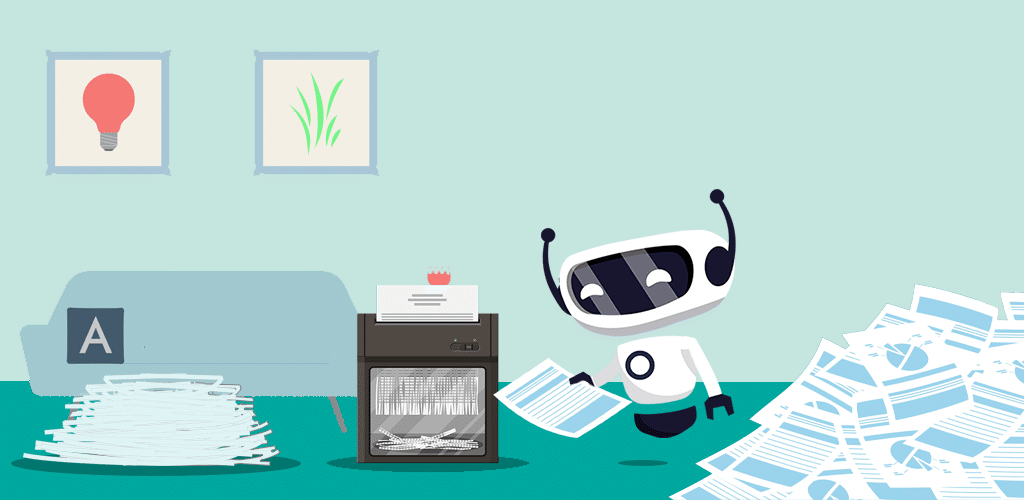September 12, 2019
Taking Your Privacy Offline: Shred Documents With Personal Information
Posted by Rhiannon

- What should you shred and when?
- What should you keep?
- What can you recycle?
- Consider going paperless
What Should Be Shredded and When?
In general, any paperwork that has your personal information on it should be shredded. This information includes anything with account numbers, birthdays, maiden names, passwords, PINs, social security/social insurance numbers, photographs, anything with a bar code, travel itineraries, and boarding passes. Shred documents including the following:
- Tax records and receipts (keep for seven years)
- Pay stubs and bank statements (keep for one year)
- Home sale, purchase, or improvement docs (keep for six years after selling the house)
- Medical bills or records (keep for at least one year after making payments)
- Warranty documents and receipts (keep for as long as you own the product)
- Social security statements (only keep the most recent copy)
- Yearly insurance policy statements (only keep the most recent copy)
- Retirement plan statements (only keep the most recent copy)
- ATM receipts (shred immediately)
- Copies of birth certificates (keep only until you’re done with them)
- Cancelled and voided checks (get rid of immediately)
- Expired licenses, Visas, and passports (keep only until they expire or are replaced)
- Employment documents (keep until you get your final tax statement after leaving a business.
- Documents related to a legal claim, such as a vehicle collision (keep for 10 years after the incident)
- Items with signatures (keep until you’re done with it)
- Junk mail with bar codes (because bar codes could contain hidden details about you)
What Should You Keep?
While it’s a great idea to shred documents that contain personal information about you, many of those docs are actually crucial to keep, as proof of identity and records of your life. Not only should you keep them, but you should also store them somewhere safe from fire or water damage in case of an accident. Even better would be to keep the originals in one place and make copies to store in another place, such as a bank deposit box. Documents that you should always keep include:
- Birth and death certificates
- Social security/insurance cards
- Passports
- Pension plan docs
- Marriage licenses
- Business licenses
- Current insurance policies
- Wills, living wills, and/or power of attorney documents
- Vehicle titles and loan records
- House deeds and mortgage documents
- Lease agreements
- Employment contracts
- Academic records (degrees/diplomas/transcripts)
- Adoption papers
- Medical records
- Military records
- Appraisals of valuables (like paintings, jewelry, etc.)
What Can You Recycle?
There are some documents that don’t need to be shredded, nor do they need to be kept forever. Instead, they can be safely recycled. These items include:
- Junk mail without bar codes
- Letters
- Paperwork without personal details
Don’t Shred Documents: Go Paperless
Even though you may shred your documents from time to time, it’s easy to forget the task and let all the paper pile up again. To cut down on the level of work you need to do repeatedly, go paperless wherever possible. Have companies send you e-bills, set up online banking for paperless statements, and scan documents into your computer to store on an external hard drive instead of in a filing cabinet.
It can be hard to differentiate which papers are safe to recycle and which should be shredded so, when in doubt, take the shredding route.
To protect your files online, considering browsing the web with HotBot VPN.
]]>Posted by Rhiannon
More Blog Posts
February 14, 2023
How the Investigatory Powers Act Impacts Citizen Privacy
In 2016, the United Kingdom passed the Investigatory Powers Act or IP Act, into law. This act empowered the government and related agencies to access and collect citizen data, without consent. Critics immediately slammed the new law. The media dubbed it the “Snoopers’ Charter.” Meanwhile, Edward Snowden described the act as “the most extreme surveillance […] Read moreFebruary 14, 2023
How to Easily Unblock Wikipedia with HotBot VPN
Wikipedia puts a wealth of information at your fingertips. Everything from the biography of Alexander Graham Bell to the basics of quantum computing can be instantly opened by curious browsers. But what happens when you can’t access that information? Whether a business network blocks it or a particular country censors it, don’t let that slow […] Read moreFebruary 14, 2023

